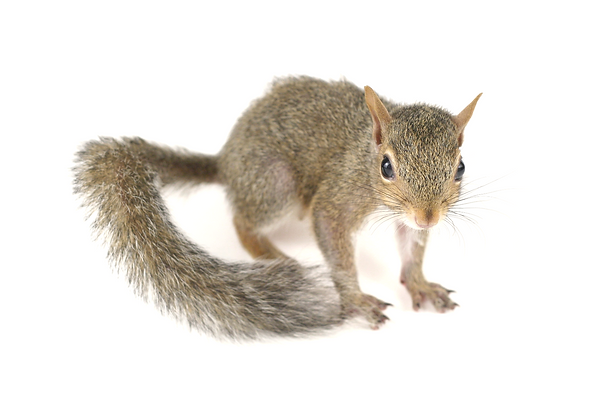
Squirrel
130
Number of squirrels that were brought to our clinic in 2015. Second only to rabbits at 152!
When people find young squirrels, whether tiny eyes-closed infants or slightly older eyes-open (but un-weaned) babies, it is usually due to one of 5 scenarios:
-
The mother is gone – trapped and removed or killed.
-
The nest has failed – high winds or heavy rain may contribute – or tree trimming/removal that destroys the nest. Young may be found on the ground or in a fallen nest.
-
The mother is moving her young, and one has fallen or been separated.
-
Predation of the nest has occurred – if a cat or crow for example, raids the nest.
-
The family pet brings a baby home – this scenario can follow any of the first four, if a pet finds a baby on the ground.
IF YOU HAVE FOUND A BABY SQUIRREL ON THE GROUND, PLACE IT IN A TALL BOX AT THE BASE OF THE TREE THAT IT FELL FROM. KEEP WARM. MOM SHOULD COME BACK WITHIN 2-3 HOURS. DO NOT FEED ANYTHING UNTIL YOU HAVE SPOKEN WITH A REHABILITATOR.
Obviously the first scenario means the young are orphaned and in immediate, often desperate need. Eyes-closed infants will be dehydrated and starving, usually having waited for their mother for a day or more before wiggling out of the nest.
Slightly older eyes-open babies often approach and follow people, even climbing up a pant leg. Baby squirrels rely on their mother for a long time, weaning gradually after about 8 weeks and remaining with mother until 12 weeks of age, so a fluffy little 6 week old, eyes-open baby, although mobile, is still totally dependent.
In the second and third (but only occasionally fourth and fifth) scenarios, the young may still be reunited with their mother, so long as they are not injured (unless the injury is superficial). One thing to note is that eyes-open babies who have been missing their mother for only hours rather than days (i.e., mom is still nearby) may be more wary than in the first scenario, and not as likely to approach people, because they will not yet be so desperate.
The reason the fourth and fifth scenarios only occasionally lead to a reunion with the mother is that predators are often attracted to unguarded nests of babies, where the mother has already gone missing, or predation itself has caused an injury, and an injured baby should not be returned to its mother.

